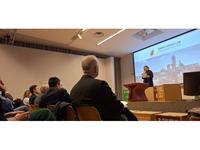Press Releases

20-12-2022 13:11
Welcome speech by the Minister of Education, Sport and Youth, Mr Prodromos Prodromou, at the Opening Meeting of TSI’s project with the Ministry of Education: “Improve implementation of policies to address school dropout - Phase 2”
Distinguished guests and collaborators in this project:
- Ms Ciresica Feyer, Deputy Head of the DG Reform Unit and Head of the Education sector, is following us online from Brussels.
- Ms Anna Zaremba, policy officer at DG REFORM and this project’s manager.
- Ms Anna Manoudi, project manager on behalf of the International Coach Federation (ICF), the contractor of this project.
- Professor Leonidas Kyriakides,
Welcome to Cyprus and the Ministry of Education.
I am also greeting the representatives or heads of the General and Vocational and Technical Education, the Pedagogical Institute, the steering committee of this project on behalf of the Ministry, and colleagues at the Ministry of Education, Sport and Youth (MOESY).
Following the new legislation on student assessment which provides for central semester examinations and promotes teachers' use of formative assessment strategies, the Ministry of Education is furnished with reliable data on student attainment. The analysis of these data paired with other student background data, for example, school and lesson absenteeism, incidents of school indiscipline, utilisation of scheduled teaching time etc., enables the Administrations of Education (General and Vocational) as well as the Minister’s office to get a better picture about the students’ learning outcomes. This picture is diversified for the various alternative education pathways provided for students in the Upper Secondary schools (General and Vocational) and enables the assessment of the educational programs provided.
The message given by this assessment analysis is clear and is in line with the EU Council Recommendations for Cyprus. For example, a significant proportion of students in certain educational programs seem to be on the spectrum of school disengagement and at risk of dropping out of school. Or even, attending school but with very poor benefit. The problem is more obvious among students from lower Socioeconomic Status (SES) or foreign immigrants. Our aim is not just to enroll all children or young students with an immigration background, but to offer them the opportunity to participate entirely and actively in education.
Also, EU council recommendations address the issue of a skills mismatch between education and the labour market, as well as the need to upgrade and promote technical and vocational education and training. This program is also aligned with the recent Council Recommendations on Pathways to School Success which call member states, for example, for the need to reduce the share of low achievers in basic skills and early school leaving. However, the measures to be taken have to promote inclusive education and training, able to encompass “equity, quality, academic performance, engagement, well-being at school, mental and physical health, and respect for diversity”.
In this respect, the MOESY has requested support to effectively implement measures to combat the problem of disengaged students, students at risk of dropping out from education, and those who have already dropped out and are willing to rejoin the education and training system.
The MOESY is seeking ways and good practices from other EU countries for the effective implementation of a series of related recommendations which stemmed from a related previous TSI project, which was fulfilled in May 2021. That project suggested various policy measures like (a) the foundation of a practical direction support programme inside the mainstream school with elements from EU good practices directed to diversified needs of low achievers and students at risk, (b) the establishment of alternative education pathways at upper secondary level which will suit the needs for students at risk, (c) the establishment of pastoral care to address issues of vulnerable student groups, (d) establishment of an early warning system for students at risk, etc.
The MOESY is facing the challenge of effectively implementing these structural reform policies. In this direction, the MOESY has requested technical support to identify the determinants involved in the processes of educational policy implementation in general, study good practices from other EU countries and contextualise them for the Cyprus educational system.
Clarifying these objectives, I ask all of you to work as a team and effectively cooperate to reach the best strategies for implementing the best feasible recommendations to combat the problem sustainably, holistically and comprehensively. In this respect, I wish you to have a fruitful discussion through this session and the sessions to be followed and produce, through group work, strategies to be followed that will enable the implementation of the policies to be suggested.
IP
Relevant Press Releases

28-03-2025 18:12
European Statistics Competition, National Phase


26-03-2025 14:03
The National Struggle Museum will remain open on 1st April 2025




